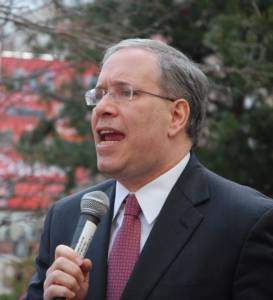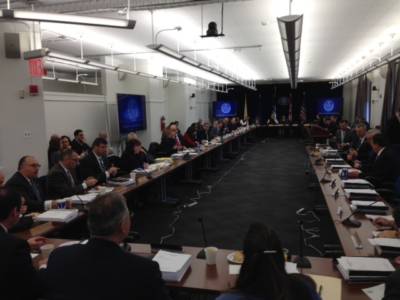In response to media inquiries about Global Divestment Mobilization activities, New York City Comptroller Scott Stringer’s spokespeople came out on the defensive this week in an attempt to defend his record on climate action through New York City’s $175 billion pension funds. The funds remain heavily invested in fossil fuel companies to the tune of more than $3 billion.
We’ve composed responses to the Comptroller’s spokespeople’s recent statements to clear the air on his rhetoric and attempts to stall further action to cut the pension funds’ ties with the dirty fossil fuel companies that control the Trump White House. 
COMPTROLLER’S SPIN:
“The Comptroller’s Office objected to the notion that Comptroller Scott Stringer has the power to unilaterally divest from a given type of financial product, noting that each of the city’s five pension funds is governed by a board of directors, and though he is the custodian of them all and sits on most, his role is advisory, and governed by fiduciary responsibility first and foremost.”
DIVESTMENT FACT:
Comptroller Stringer is the legal custodian of the 5 pension funds. The Comptroller’s office hires and manages the funds’ investment managers – those individuals and firms that give advice and make decisions about what to invest in and when. The Comptroller is also designated as the advisor for the funds. He is represented by his chosen trustee on 4 of the 5 fund boards. While a resolution to divest would need a majority of any individual pension board’s trustees to be enacted, if Comptroller Stringer, as the fund manager, championed fossil fuel divestment, a resolution would pass.

DIVESTMENT FACT:
Other pension boards and cities from around the world have committed in a fiscally prudent and financially responsible fashion to divest from fossil fuels. More than 700 institutions, including many in New York state, with assets totalling more than $5.4 trillion, have committed to divestment. No one expects that completion of divestment would happen overnight – that would be a financial mistake. Immediately stopping new investments and divesting the funds’ current fossil fuel holdings in an orderly fashion by 2020 is a smart, conservative approach.
COMPTROLLER’S SPIN:
“… [the] economic interests [of pensioners] must come before anything else,” [Stringer] spokesman Jack Sterne wrote in an email. “Those faces, and those New Yorkers trying to get by, must legally and morally be his priority. He shares the ideals of the activists.”
DIVESTMENT FACT:
It is financially prudent to divest from oil, gas, and coal. Increasingly fossil fuel investments are being seen as financially risky particularly as medium or long term holdings, which is the traditional time horizon for pension funds to invest their assets.
On a daily basis, analysts, economists and even heads of sovereign banks such as the Bank of England are reporting on the increasing riskiness of fossil fuel sector investments, predicting that the rise of renewables, including electric cars, wind and solar, and increasingly restrictive regulations on the burning of fossil fuels, are likely to lead to less profitable companies and decreased returns.
This is backed by more specific New York reports that have analysed potential losses incurred by the NY city and state funds. A February 2016 report found that the Teacher’s Retirement System of the City of New York lost approximately $135 million from its holdings in fossil fuel companies in one year alone. A comparable March 2016 report found that the New York State pension fund, with similar types of investments as the city funds, lost a staggering $5.3 billion from its holdings in fossil fuel companies. That loss would have made each of the fund’s 1.1 million members more than $4,500 richer, and could have helped the state cover nearly 12% of the costs following Superstorm Sandy.
More information about financial responsibility and fiduciary duty of New York City Pension Trustees can be found in this briefing report.
“Oil and gas [stocks] have been a major contributor to pension funds for decades. But that is changing,” he says. “Any fund that is not [having] internal discussions [about fossil fuel exposure] is not doing its fiduciary duty.” Tom Sanzillo, former deputy NY state comptroller
COMPTROLLER’S SPIN:
“Stringer has spearheaded several efforts to use the pension funds as a vehicle for fighting climate change. Stringer’s office touts the comptroller’s efforts to push for what’s called proxy access, which allows shareholders to seek seats on corporate boards. Stringer has sought proxy access at more than 100 firms and won it at 96, including 38 carbon-intensive companies, according to a February WNYC story. Stringer credits the campaign for Exxon electing former National Oceanic and Atmospheric Administration climate scientist Susan Avery to its board.”
DIVESTMENT FACT:
ExxonMobil is currently under investigation by New York’s own Attorney General Eric Schneiderman for potential fraud related to decades-long campaign of public misinformation about climate change. Every year that a shareholder resolution has been submitted to ExxonMobil on a climate issue, the company has fought tooth and nail to have it removed forcing the Securities and Exchange Commission to intervene. The Exxon board has consistently recommended against shareholders voting for climate initiatives at the company. Though a former NOAA scientist is now on the board at Exxon, she is one vote amongst thirteen. Exxon’s fundamental business model of exploiting its total oil and gas reserves is in not compatible with limiting global warming to a maximum of 2 degrees. 
Proxy access, which Comptroller Stringer has championed, may help so-called “activist” investors, who are often large institutional funds or other large investors, win action on their non-climate and profit making priorities, but there is no evidence that proxy access or other shareholder engagement has produced any meaningful change on climate issues with fossil fuel corporations. Simply put these companies make money off climate destruction: that’s their business model. Strongly-worded letters to Exxon’s CEO do not result in any change.
COMPTROLLER’S SPIN:
A study of the pensions funds and how ther could invest with an eye to reducing carbon impact has been initiated. Comptroller Stringer is now seeking investment managers “capable of providing sustainable or low-carbon investment options”.
DIVESTMENT FACT:
The quickest way to a low carbon fund is to cut investments in fossil fuel companies that have the largest carbon footprint and hold the largest fossil fuel reserves. There is a handy list published each year by the respected Fossil Free Indexes that is used by investment firms around the world. While it’s a tiny step in the right direction to hire new managers that have an understanding of low carbon investing, commissioning time consuming, expensive reports on a topic that’s been extensively studied is fiscally wasteful and seems to be used as an excuse for inaction. Time is running out as we rapidly approach 2 degree warming scenario. Many large pension and institutional funds have divested because it is financially prudent and morally imperative. Right now, Trump is destroying our collective future. Comptroller Stringer has repeatedly talked about standing up to Trump: it’s time to put the funds’ money behind that rhetoric to make an impact. We need action now.